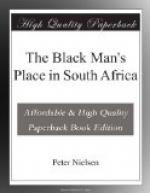Taking the civilisation of to-day to mean an ordered and advanced state of society in which all men are equally bound and entitled to share the burdens and privileges of the whole political and social life according to their individual limitations we ask whether the African Natives are capable of acquiring this civilisation, and whether, if it be proved that their capacity for progress is equal to that of the Europeans, the demand for full racial equality that must inevitably follow can in fairness be denied. This I take to be the crux of the Native Question in South Africa.
Before we attempt to answer this question it is necessary to find out, if we can, in what ways the African differs from the European; for if it be found that there are radical and inherent differences between the two races of a kind that seem certain to remain unaltered by new influences and changed environment then the whites will feel justified in denying equality where nature herself has made it impossible, whereas if the existing difference be proved to be only outwardly acquired and not inwardly heritable then the coming demand for equality will stand supported by natural right which may not be ignored. The question, then, before us is this. Is the African Native equal to the European in mental and moral capacity or is he not? We must have an answer to this question, for we cannot assign to the Native his proper place in the general scheme of our civilisation till we know exactly what manner of man he is.
We of to-day are rightly proud of our freedom from the sour superstitions and religious animosities of the past, but these hindrances to progress and general happiness were only dispelled by the light of scientific thought and clear reasoning. Let us then bring to bear that same blessed light upon our present enquiry into the reasons, real or fancied, for those prejudices of race and colour which we still retain, for it is only by removing the misconceptions and false notions that obscure our view that we can come to a clear understanding of the many complex issues that make up the great Native problem of Africa.
BODILY DIFFERENCES.
“That which distinguishes man from the beast,” said Beaumarchais, “is drinking without being thirsty, and making love at all seasons,” and he spoke perhaps truer than he knew, for the fact that man is not bound by seasons and is not in entire subjection to his environment is the cardinal distinction between him and the brutes. This distinction was won through man’s possession of a thinking brain which caused or coincided with an upright carriage whereby his two hands were set free from the lowly service of mere locomotion to make fire and to fashion the tools wherewith he was enabled to control his environment instead of remaining like the animals entirely controlled by it. This wonderful brain also made possible the communication and tradition of his experiences and ideas through articulate speech by which means his successors in each generation were able to keep and develop the slowly spelt lessons of human life.




